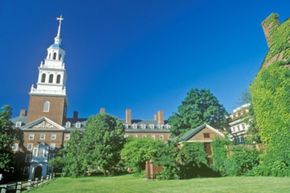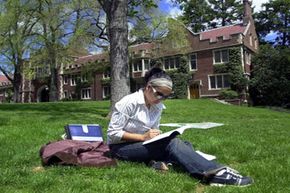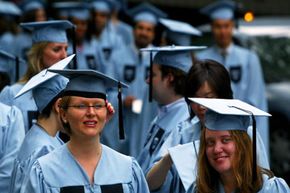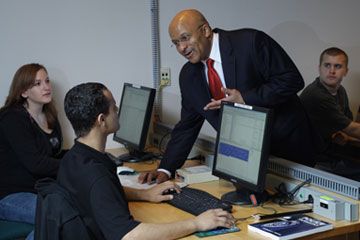Nearly 30,000 exceptionally qualified students applied for 2,131 places in the Harvard University undergraduate class of 2013. That's an acceptance rate of 7.32 percent. At Princeton University, 21,964 applicants fought for 2,181 spots. In total, the eight colleges in the so-called Ivy League collected more than 200,000 applications from the nation's (and the world's) top-performing high school students -- and only sent acceptance letters to 11.9 percent of them [source: Hernandez College Consulting]. That's what we call selective.
The term "Ivy League" was born in the 1930s as a name for the fledgling football league that included eight prominent Northeastern colleges: Brown, Columbia, Cornell, Dartmouth, Harvard, Penn, Princeton and Yale. Today, the Ivy League is less synonymous with sports than its academic rigor, professional achievement and exclusivity.
Advertisement
According to U.S. News & World Report, there are five Ivy League schools among the top 10 universities in the United States. The other three Ivies make the top 20. Harvard, Yale and Princeton are the perennial powerhouses, regularly swapping the top three spots in the national rankings.
Even as the selectivity of America's colleges remains flat -- one study says that colleges are less selective overall than they were in the 1950s -- the Ivy League draws more and more applications for roughly the same amount of spots [source: Ruiz].
The tightly concentrated demand at the Ivy League schools can be at least partially explained by the power of the Ivy League brand name, which many high-achieving students (and their parents) equate with the only path to success and wealth. The increasing selectivity of the Ivy League admissions process only exacerbates the problem, creating hordes of Ivy-obsessed students who place unhealthy pressure on themselves to be accepted.
The danger of the brand-name, "bumper-sticker" mentality is that an Ivy League education is being sold as a product rather than a valuable experience. And students, in a desperate attempt to obtain that product at any cost, sometimes turn the application process into a marketing campaign, or worse, a business [source: O'Brien]. They hire expensive counselors and coaches and tutors who "package" their skills, talents and experience into something no admissions officer can resist.
If you're intrigued by the Ivy League, keep reading to learn more about the credentials sought by these elite universities and how you can improve your odds of admission.
Advertisement



